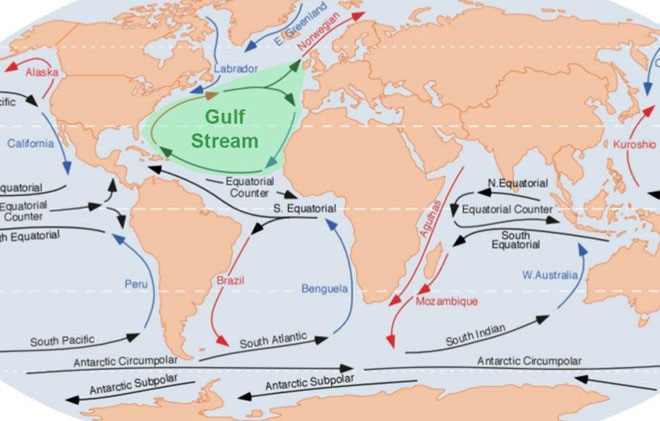What if the sea is no longer salty?
If the sea is no longer salty, the ecosystem will be turned upside down. At the same time, the weather will become more severe for humans.
According to the US Geological Survey (USGS), the Earth is estimated to have 1,386 million cubic kilometers of water. Of which, 96.5% is salt water. The rest is fresh water in rivers, lakes, glaciers or floating in the sky in the form of steam.
According to WHO, 1 in 7 people on the planet do not have access to clean water. It is forecasted that by 2030, when the world population doubles, there will be 50% of people without clean water.
If we convert saline water from the ocean into fresh water, the problem of water shortage can be solved. However, things are not so simple.

Each year 4 billion tons of salt flow from the rivers to the sea.
Why is the sea salty?
Saline sea water is caused by the flow of rivers. The continuous pouring of water into the sea does not dilute it, but instead it makes the sea salty.
Water from rivers also contains salt, but only 1/70 times as saline. This salt is taken from the erosion of rocks and minerals. After being dumped into the sea, the evaporation of water leaves behind the salt from the rivers. This makes sea water more and more salty.
According to Palomar.edu, every year 4 billion tons of salt is dumped into the oceans from rivers alone. During billions of years of Earth's existence, 50 million billion tons of salt from the mainland were dumped into the sea along rivers.
If the sea is not salty, the ecosystem will be turned upside down
But if all the water turns sweet, life on the planet will be turned upside down . Countless marine creatures can only exist in salt water.
Currently humans have discovered more than 260,000 species of marine life. But that is only a small part of the ocean, there are still many species that have not been "seen" by humans yet.
Without them humanity would lose precious food resources. This not only affects the economies of the fishery dependent countries but also the importing countries are involved.
In addition, 10,000 species of seaweed will no longer exist. Algae are special creatures because they are both animals and plants. They can eat organic matter that helps purify the water. At the same time, they can photosynthesize to help consume CO2 and emit oxygen.
Oxygen levels will drop significantly without algae. Algae purify 70% of the oxygen on Earth, not trees. This is because plants create and consume their own oxygen. Algae produce oxygen, but when they die, the carbon they sink will sink to the bottom of the sea, forming oil.
Sweet sea will change climate
Not stopping there, oceans play a large part in climate formation. Ocean currents can affect land weather. Current currents are due to differences in density.
When the water evaporates, the salt is left behind. The salt water will get heavier and sink below. The movement of the difference in salt concentration will create currents. In addition to salt, the terrain and wind also affect.
The currents will bring warm or cool water thousands of kilometers away. This amount of water can warm or cool the air through which the wind blows. This changes the climate of many land areas.

The Gulf currents make the climate of Western Europe warmer in Russia.
For example, the Gulf current carries warm water from the tropics and subtropics on the Atlantic Ocean to the north and warms the waters of Western Europe. As a result, the temperature here is warmer than other places at the same latitude.
Salt water also has lower freezing temperatures. Without salt, the oceans will freeze more in the winter. Hot climates will be hotter and colder places will be colder. Large storms will occur more frequently both on land and sea because of temperature differences.
Rapid climate change will cause inland species to adapt and become extinct.
But eventually, millions of years later, salt will reappear in the oceans through the process of flowing into the sea of rivers carrying mineral salts. At the same time, minerals of the Earth's crust will continue to be dissolved into the sea.
- Why do salty snacks make people eat as much as they crave?
- Eating salty makes your body grow old
- Why is the sea salty?
- Why can't we eat too salty?
- How to limit salt intake
- Health - what to do 'because of the habit of eating salty and eating light
- The Baltic Sea has the tastiest salty taste
- Why tears are salted?
- The scientist developed a pair of electronic chopsticks, stimulating the salty taste in the tongue with ... electricity
- 90% of people eat salty, but Vietnam is still the top iodine deficiency in the world because of this habit
- The effects of salty eating on the human body
- Eating salt kills 1.6 million people every year
 Surprised: Fish that live in the dark ocean still see colors
Surprised: Fish that live in the dark ocean still see colors Japan suddenly caught the creature that caused the earthquake in the legend
Japan suddenly caught the creature that caused the earthquake in the legend A series of gray whale carcasses washed ashore on California's coast
A series of gray whale carcasses washed ashore on California's coast Compare the size of shark species in the world
Compare the size of shark species in the world